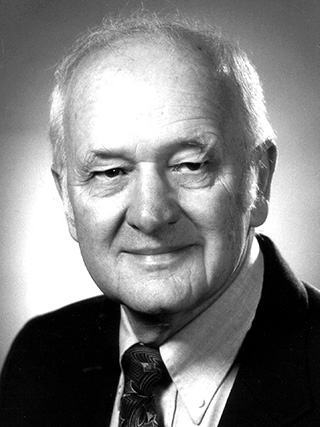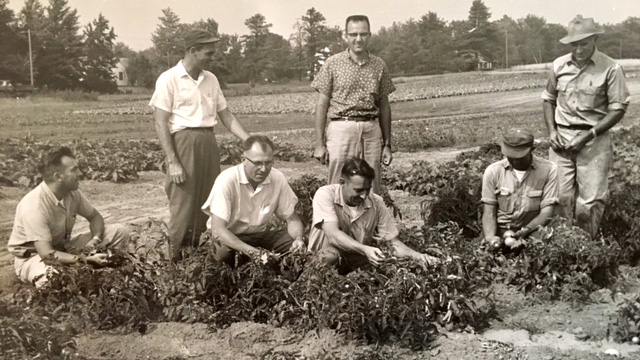
By Linda McCandless, reposted from CALS International Programs News:
A man who leads a life well-lived and well-liked is often recognized in his passing by those whom he has touched. We were able to gather a few words and images of Edwin Burnell Oyer, international professor emeritus in vegetable crops, who died on November 15, 2016, at the age of 89. Many people in horticulture and International Programs at Cornell and in institutions globally will always remember the kindness, expertise, and wise counsel they received from Ed during his professional life.
Edwin Oyer joined the Department of Vegetable Crops at Cornell in 1955 after receiving his B.S., M.S. and Ph.D. degrees from Purdue University. He was awarded a NATO Fellowship in Science in 1961 to conduct vegetable research at Le Phytotron in Gif-sur-Yvette, France. From there, he served on the faculty of the Department of Horticulture at Purdue from 1963 to 1966 before returning to Cornell to chair the Department of Vegetable Crops from 1966 to 1971.
In 1972, Ed helped found the Asian Vegetable Research and Development Center in Taiwan where he served as deputy director for research until 1974, when he returned to Cornell to direct the International Agriculture Program in the College of Agriculture & Life Sciences.
In 1977, he joined the newly established International Agricultural Development Service where he served as the project leader for a World Bank financed project to establish the Agency for Agricultural Research and Development in the Republic of Indonesia. In 1982, he returned to Cornell once again to resume his position as director of the International Agricultural Program, where he served until his retirement in 1992.
Chris Wien, professor emeritus of horticulture, remembers Ed as, “A most kind, generous and outgoing man, who had sincere interest in fostering international agricultural development.”
“Ed was much appreciated for his energy, cheerful disposition, optimistic outlook, skillful human relations, and wise counsel,” said Elmer Ewing, professor emeritus of horticulture and veg crops.
Ronnie Coffman, the current director of International Programs, remembers Ed at many junctures in his career, starting from his first recollection dating back to 1971 when he arrived in Los Baños, Philippines to take up his new post as a rice breeder at the International Rice Research Institute (IRRI). “Ed was serving as the last Director of the University of the Philippines Cornell (UPCO) project,” said Ronnie. “The project had operated for 20 years and it had been agreed by all concerned that it was time for Cornell to move on and leave the University of the Philippines at Los Baños (UPLB) to its business. Winding things down was a delicate matter, so Cornell had sent Ed, one of its most diplomatic administrators, to do the job. He was more than up to the task. He and his wife Mary Ann immediately hosted a dinner to welcome my wife Charlotte and me to the community. It was clear that Ed was tremendously respected by his colleagues at UPLB and IRRI.”
Ronnie went on to say that Ed’s successful work at UPCO attracted the attention of Dr. Robert Chandler, the founding Director of IRRI, who, in early 1972, was just moving to the challenge of founding the Asia Vegetable Research and Development Center (AVRDC) in Taiwan. “Ed, who had been chair of the Vegetable Crops Department (later incorporated into Horticulture) at Cornell, agreed to help Chandler as his deputy director for research,” said Coffman. “It was another successful endeavor for both Ed and Dr. Chandler.”
By the time Ronnie returned to Cornell some 10 years later in 1981, he found Ed waiting for him as director of the Office of International Programs in CALS (IP-CALS). “I was hired as an International Professor of Plant Breeding, and always figured that Ed had some influence on the decision,” said Ronnie, who is the current director of IP-CALS. “It has been wonderful to have Ed’s help as a senior advisor over the past 15 years or so. Ed was eternally optimistic and, as such, will live on as an inspiration to everyone in IP-CALS as we face the future.”



